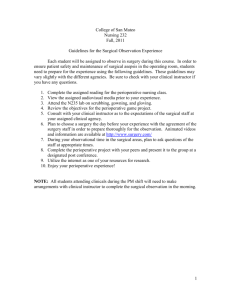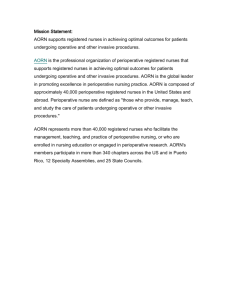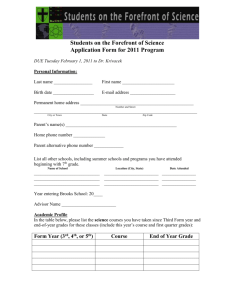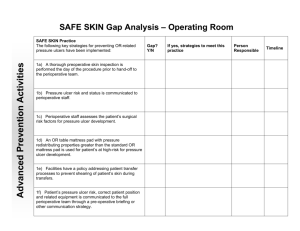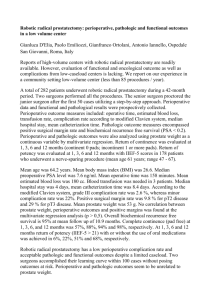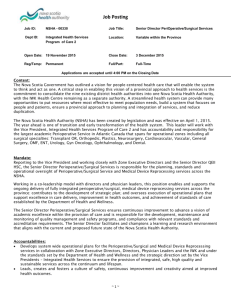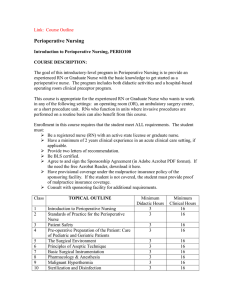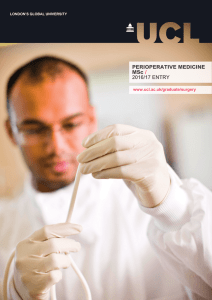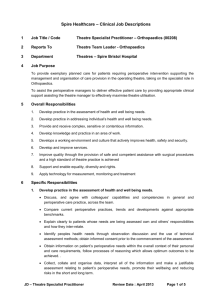PERIOPERATIVE CNS SPECIALTY CERTIFICATION EXAM Task
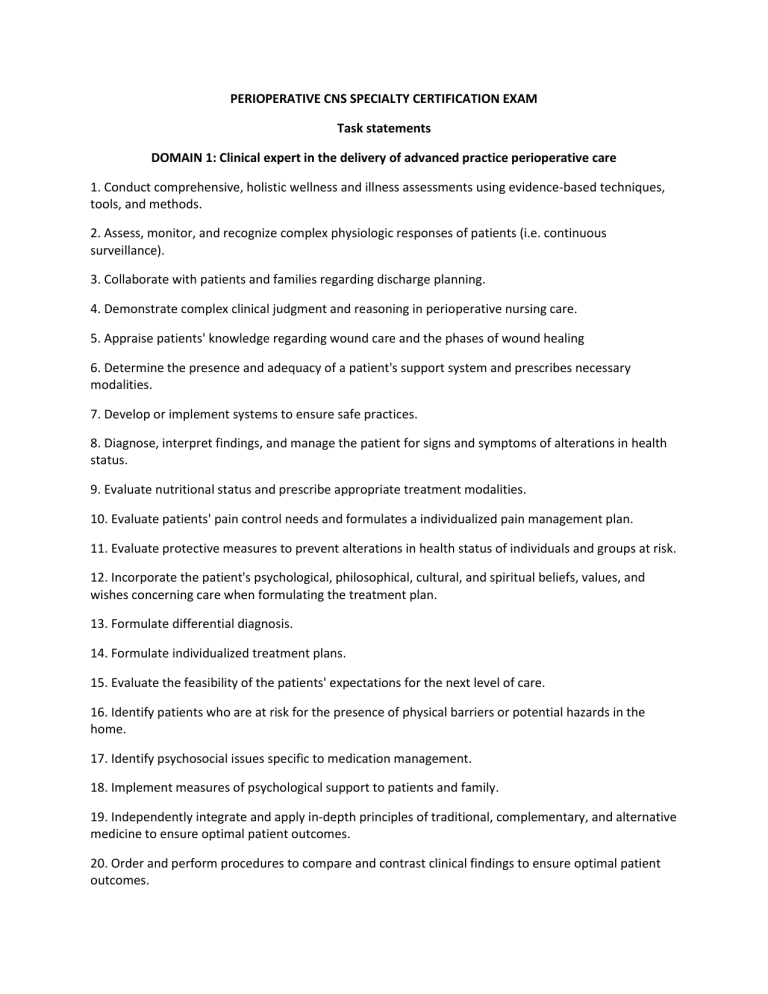
PERIOPERATIVE CNS SPECIALTY CERTIFICATION EXAM
Task statements
DOMAIN 1: Clinical expert in the delivery of advanced practice perioperative care
1. Conduct comprehensive, holistic wellness and illness assessments using evidence-based techniques, tools, and methods.
2. Assess, monitor, and recognize complex physiologic responses of patients (i.e. continuous surveillance).
3. Collaborate with patients and families regarding discharge planning.
4. Demonstrate complex clinical judgment and reasoning in perioperative nursing care.
5. Appraise patients' knowledge regarding wound care and the phases of wound healing
6. Determine the presence and adequacy of a patient's support system and prescribes necessary modalities.
7. Develop or implement systems to ensure safe practices.
8. Diagnose, interpret findings, and manage the patient for signs and symptoms of alterations in health status.
9. Evaluate nutritional status and prescribe appropriate treatment modalities.
10. Evaluate patients' pain control needs and formulates a individualized pain management plan.
11. Evaluate protective measures to prevent alterations in health status of individuals and groups at risk.
12. Incorporate the patient's psychological, philosophical, cultural, and spiritual beliefs, values, and wishes concerning care when formulating the treatment plan.
13. Formulate differential diagnosis.
14. Formulate individualized treatment plans.
15. Evaluate the feasibility of the patients' expectations for the next level of care.
16. Identify patients who are at risk for the presence of physical barriers or potential hazards in the home.
17. Identify psychosocial issues specific to medication management.
18. Implement measures of psychological support to patients and family.
19. Independently integrate and apply in-depth principles of traditional, complementary, and alternative medicine to ensure optimal patient outcomes.
20. Order and perform procedures to compare and contrast clinical findings to ensure optimal patient outcomes.
21. Order, prescribe, initiate, and interpret diagnostic, therapeutic, and/or pharmacologic interventions.
22. Perform comprehensive and individualized patient assessments .
23. Perform history and physical examinations.
24. Provide an in-depth interpretation of patient conditions and gives rationales for procedures.
25. Provide anticipatory guidance for expected and potential situational changes.
26. Synthesize knowledge of therapeutic regimens and patient response for evaluation of care.
DOMAIN 2: Consultant (Intra- and multidisciplinary)
1. Collaborate with other disciplines and coordinates multidisciplinary activities (e.g., education, consultation, patient management, research opportunities) to enhance patient care.
2. Consult with the appropriate health care providers to initiate new treatments or change existing treatments.
3. Provide consultation services to the organization to achieve quality, cost-effective outcomes for perioperative patients.
4. Serve as an expert resource on perioperative issues.
DOMAIN 3: Education (nurse, other healthcare providers, patient, family and community)
1. Develop perioperative educational programs for : a. healthcare professionals b. individual patients, groups of patients, and their designated support persons based on identified needs c. the community.
2. Coordinate perioperative educational programs for:
1.
healthcare professionals. b. individual patients, groups of patients, and their designated support persons based on identified needs. c. the community.
3. Implement perioperative educational programs for: a. healthcare professionals. b. individual patients, groups of patients, and their designated support persons based on identified needs.
c. the community.
4. Evaluate perioperative educational programs for:
a. healthcare professionals.
b. individual patients, groups of patients, and their designated support persons based on identified needs. c. the community.
5. Link teaching to evidence-based practice and its effects on clinical and fiscal outcomes.
DOMAIN 4: Clinical Inquiry
1. Evaluate health outcomes to assist in shaping health care and nursing practice.
2. Evaluate the outcomes of patient safety initiatives.
3. Interpret research findings and use scientific inquiry to validate and/or change clinical practice.
4. Participate in the generation, application, and /or dissemination of research and Evidence-Based
Practice.
5. Promote the use of nationally accepted clinical practice guidelines and standards.
6. Provide leadership when applying research to practice innovations which enhance patient care.
7. Submit findings of clinical research , Evidence-Based Practice and process improvement projects to scholarly journals and/or for poster or educational sessions at conferences.
8. Synthesize research findings.
DOMAIN 5: Organizational and Systems Thinking
1. Actively participate in the organization's method of financing delivery of care.
2. Analyze human factors that influence adherence to policies, procedures, standards of care, and documentation.
3. Analyze legislative review and policy making that influences health services.
4. Cultivate system awareness of advancements in health care through membership in professional organizations.
5. Evaluate the organization for limitations and recommend improvements that influence patient health outcomes.
6. Facilitate multidisciplinary groups in designing and/or implementing innovative practices and alternative solutions to patient care issues.
7. Identify risk management strategies and develop performance improvement programs to establish and maintain a safe therapeutic environment.
8. Integrate a culture of safety within the organization.
9. Interpret or facilitate staff member access to and compliance with current state, local, and federal safety regulations and accreditation standards (e.g., TJC, OSHA).
10. Lead in new technology and product review committees.
11. Promote nursing practice that is visionary and inventive to improve delivery of care.
12. Promote system participation in efforts to diminish cost and unnecessary duplication of testing and diagnostic activities and facilitates timely treatment of patients.
13. Validate the effects of risk analysis and reduction initiatives.
DOMAIN 6: Professional accountability
1. Coach professionals to provide care that leads to the highest standards of practice.
2. Contribute to the development of services that are consistent, comparable in all settings, and performed within the legal and ethical scope of practice.
3. Educate patients of the risks, benefits, and expected outcomes of planned procedures and provide informed consent.
4. Evaluate care according to professional standards and state Advanced Practice nursing regulations.
5. Evaluate the ethical implications of scientific advances, their cost and clinical effectiveness, and patients' and designated support persons' acceptance and satisfaction with these advances.
6. Demonstrate professional accountability.
7. Promote the dimensions of perioperative APRN practice to the public, legislators, policy makers, the nursing profession and other health care professionals.
8. Serve as a role model to encourages other professionals to remain current within their profession by attending workshops or association meetings, reading journals, and participating on committees.
9. Utilize an ethical framework to evaluate individual or system issues regarding care.

